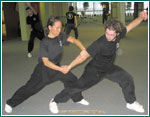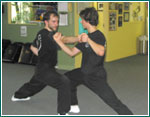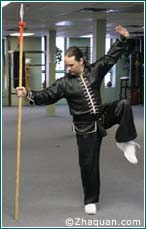Tips on how to improve your Kung fu
Here are a few guide lines for the serious students who wish to become good at their art.
1- Make the knowledge yours:
What you learn is a treasure. Treat it as such by;
a) Making sure you remember the moves your teacher taught you. don't rely on your teacher to remind you every time you forget. Take notes, ask for the names of the moves etc... If you keep forgetting, your teacher will know you're not a serious student. Think about it, when something is important to you, you will make the effort not to loose it. Make the knowledge yours!
b) Study the move or the form by trying to figure out all the possible applications, variations, drill them with a partner, practice them on the heavy hag and try it out in sparring.
c) Don't assume you mastered it once you know it. Always try to improve it by putting more power, more speed, being more loose, improving stances etc...
d) Don't be in such a hurry to move to the next form. If your teacher didn't teach you a new form, it's probably because the current one still needs improvement. If you keep asking your teacher to teach a new move (which by the way is not polite), your teacher might finally give up and teach you the new move, but at the same time he will know you're not a serious student so he might not bother going in details thinking you won't appreciate it.
2- Practice for yourself:
Don't practice for your teacher. Some students pretend to practice hard when the teacher is looking but as soon as he turns his back they take a break or slack off. Trust me, your teacher knows if you put the effort or not. If he didn't say anything, it's probably because he'd rather spend extra time with the student that appreciates it instead of wasting time doing discipline.
A serious student practices for himself (or herself) and trains hard whether his teacher is looking or not.
3- Learn to focus:
If you are not able to focus your mind on your practice, don't expect to reach a high level in kung fu. Sometimes I see students practice something (anything from forms, bag work, drills etc..) and then they look bored after 5 or 10 minutes and want to move on to something else. If you want your knife to be sharp you have to take the time to sharpen it properly! If you give up too soon, don't expect to be able to cut anything with it.
4- Train your mind:
If you're injured or for some other reason you can't train or go to class, keep reviewing your forms in your mind, analyze your moves in your mind. At the same time you will learn to focus your mind on what you are doing. Again, if you find it boring or uninteresting to do that, don't expect to reach a high level in martial arts.
Approach your Kung fu training the same way serious musicians approach their art. For example, classical musicians don't just play tunes, they analyze the piece, isolate difficult passages, play the piece at a slower pace, sometimes a faster pace, they read it on paper (without using their instrument), they get as familiar as they can with their piece before they can perform. Kung fu practitioners must do the same. They get familiar with their techniques to a point where it becomes second nature.
In conclusion:
In most cases, a teacher knows from day one to which category a student belongs to. It's very rare that it changes along the way. That being said, it's a question of where to put your priorities. Anyone can achieve whatever they want if they're willing to put the time and effort required. Don't think anything is out of reach. Know what your goals are, and set yourself a plan to attain them. Never take anything for granted because that's when you stop evolving.
It is important to have long term goals, but don't be too distracted by them. Instead of focussing too much on the destination, enjoy the ride!
-Sifu Julien Valiquette (2007)








